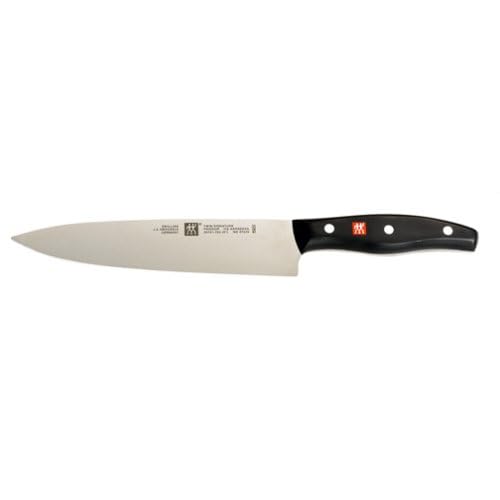Dish-Gracepoint Berkeley kitchen tool of the month: Chef Knife

For September, a good chef's knife is the tool of the month for Dish-Gracepoint Fellowship Church.
A key tool in any kitchen is a sharp knife. Believe it or not, a very sharp knife will actually reduce the probability of cutting yourself. How? A sharp knife will cut things in one smooth motion where a dull, cheap knife can get stuck halfway and require you to really work at it and increase the odds of accidentally cutting yourself.
The chef knife is a versatile, all-in-one knife that could be used in almost any situation.
What's my personal recommendation? I like the Henckel Twin Signature 8 inch Chef Knife. The 6 inch knife is good too, but I like the longer 8 inch blade.
What should I look for in a knife? If you get the Henckel, get the one with 2 men on the blade. The twin version is German made and the single version is made in China. There is a big difference in the two. How should I care for the knife? Store it in a wooden block or a magnetic bar to keep it sharp. If you just throw it into a drawer, the blade comes in contact with other metals and will become dull as they move around. Tip: As you cut, hold the meat with your left hand and instead of pressing straight down, move your knife forward as you go down (like a saw). If the blade is sharp, it will cut through most meats like a lightsaber.
Comments
Also, if you do a lot of chopping and prep you can also consider santoku knives.. henckels makes a few and if you get a bonus at work, go Shun. Santoku are a bit shorter but veggies and meats slide off the blade so clean and your cucumbers or whatever dont go flying all over the place.
Anyone have any thoughts on ceramics? i like the weight of regular knives personally..
-Never let the edge contact anything as hard or harder than the knife's metal (e.g. other metals, ceramics, etc.) Resist the temptation to carve things on plates/in pots or pans: just go get a cutting board.
-This means never toss your knife into a drawer with a ton of other knives and junk. This is one of the fastest ways to ruin otherwise good knives.
-Never cut highly acidic items (limes, lemons, kimchi, etc.) with a good knife. Get a throw-away knife to cut these items (like all those knives you already threw into your drawer before!)
-Hone your blade on a steel before every use. If you've followed the above rules, your knife should keep its edge for at least a couple years even if it's a bad knife, but it will lose it's straightness very easily and will need honing often. Maybe Tom will post an article on how to do this at some point.
-If you need to get your knife sharpened, call a professional to do it (many will come to your house). Knife sharpening is actually pretty difficult and you probably don't want to learn how to do it. If you are treating your knives well you won't need to get them sharpened for several years.
Spend the time to follow these rules. A good knife combined with proper cutting technique saves you tons of time in the long run, especially when dealing with the quantities of ingredients required for small group.